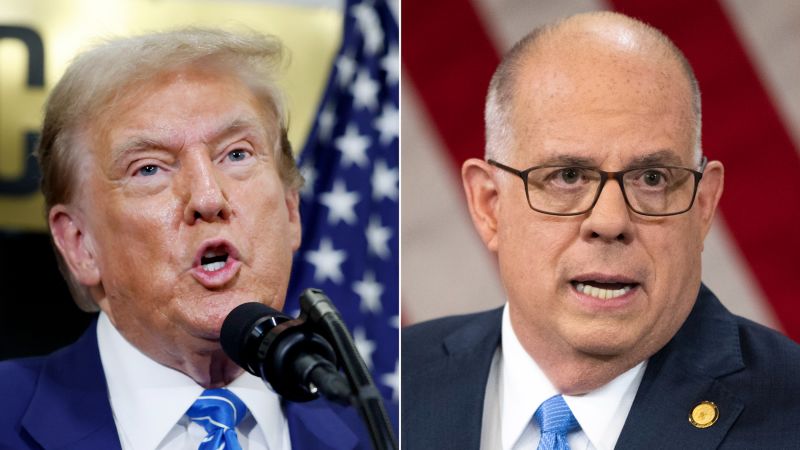Former President Donald Trump expressed his support for Maryland Senate candidate Larry Hogan, stating that he would like to see Hogan win the election in November. Trump made these comments during an interview with a Fox News reporter in Washington, DC. He mentioned that he is about the party and the country, and believes that Hogan has a good chance of winning. Trump also hinted that he would be endorsing Hogan, even though nobody had directly asked him to do so. In response to Trump’s endorsement, Hogan’s spokesman clarified that the Governor is not supporting Trump, just as he didn’t in 2016 and 2020.
Hogan is running against Democratic nominee Angela Alsobrooks for the Senate seat being vacated by retiring Senator Ben Cardin. Maryland, a deep-blue state, has not elected a Republican senator since 1980, but Hogan’s popularity as a two-term former governor has made the race competitive. Trump’s endorsement of Hogan comes after Hogan urged Americans to “respect the verdict” in Trump’s New York hush money trial, where Trump was found guilty on multiple felony counts. Trump’s allies criticized Hogan for his statement, with some suggesting that Hogan’s campaign was over. Despite the backlash, Hogan continued to stand by his criticism of Trump, stating that a Trump versus Joe Biden matchup was a “terrible choice.”
Hogan’s comments about the potential outcomes of the election were sobering, as he hinted that if Trump loses, it could mean the end of the movement associated with him, leading to a shift towards a more inclusive Republican party. He expressed his belief that a Trump victory would prolong the influence of Trump’s style of politics within the party. Hogan has been vocal in his criticism of Trump, previously stating that he would not vote for either Trump or Biden in a presidential election. It is clear that Hogan’s stance against Trump has not wavered despite the growing support for the former President within the Republican party.
The dynamics of the Maryland Senate race have been shaped by Trump’s involvement, with Hogan’s candidacy injecting a level of competitiveness into the race that was not initially expected. Trump’s endorsement of Hogan may further solidify his position in the race, especially among Republican voters who remain loyal to the former President. Hogan’s willingness to stand up against Trump and express his own views on the direction of the Republican party sets him apart from many other GOP leaders who have aligned themselves with Trump. It remains to be seen how Trump’s endorsement will impact Hogan’s campaign and the overall outcome of the Senate race in Maryland.
In conclusion, the relationship between Trump and Hogan exemplifies the ongoing struggle within the Republican party between those who support Trump’s style of politics and those who seek to move the party in a different direction. Hogan’s willingness to stand up against Trump and maintain his own principles highlights the complexities within the GOP. The Maryland Senate race has become a battleground for these competing ideologies, with Hogan’s candidacy challenging the traditional political landscape in the state. The outcome of the election will provide valuable insight into the future of the Republican party and the influence of Trump’s movement within it.













